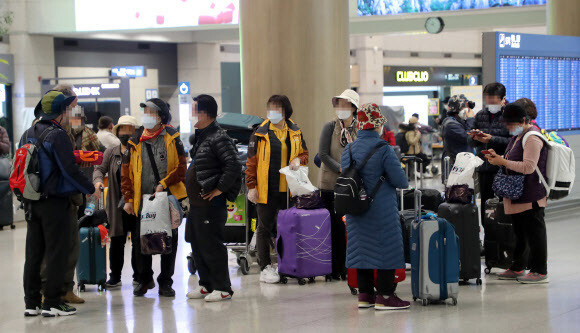hankyoreh
Links to other country sites 다른 나라 사이트 링크
25 countries restrict entry for S. Koreans as novel coronavirus continues to spread

The African island nation of Mauritius recently made the decision to bar entry to 34 South Korean newlyweds, who arrived in the country for their honeymoon but were quarantined upon arrival at the airport. Around 420 South Korean tourists were denied entry in Israel and returned home on planes chartered by the Israeli government. The number of countries restricting entry to foreign nationals who have been in South Korea has increased to 25.
According to accounts from the Ministry of Foreign Affairs (MOFA) and other sources on Feb. 25, the Mauritius government notified the local South Korean embassy on Feb. 24 that it had decided to prohibit entry to 34 South Korean newlyweds who had been stopped at the airport. As a result, the South Koreans -- who had been placed in quarantine after arriving in Mauritius on the afternoon of Feb. 23 -- were all required to return home. The Mauritius government also decided to bar entry to all foreign nationals whose flights originate in South Korea or who have been in South Korea over the past 14 days.
Around 420 South Korean tourists who had been confined while traveling in Israel arrived at Incheon International Airport on Feb. 25 aboard two flights chartered by the Israeli government. The costs of the flights were paid by the Israeli government, which has prohibited entry to foreign nationals who have been in South Korea since Feb. 24.
The decision to immediately repatriate South Korean travelers ahead of schedule is based on concerns of spreading COVID-19, the disease caused by the novel coronavirus. MOFA explained that a third charter plane “was not provided due to the low number of applicants.”
Amid a steady rise in the number of South Korean COVID-19 patients, the number of countries either barring entry to or augmenting immigration procedures for foreign nationals arriving from South Korea has increased to 25. To date, a total of 10 countries and territories have barred entry from South Korea outright: Israel, Bahrain, Hong Kong, Jordan, Kiribati, Samoa, American Samoa, Mauritius, Nauru, and Iraq. Hong Kong and Mauritius are both recent additions. Fifteen countries and territories have imposed more stringent immigration procedures, including temporary isolation and health observation for travelers arriving from South Korea, including Macau, Singapore, Thailand, Micronesia, the United Kingdom, Kazakhstan, Turkmenistan, Oman, Qatar, Uganda, Taiwan, and Vietnam.
US CDC upgrades travel warning to South Korea to Level 3The US Centers for Disease Control (CDC) upgraded its travel warning for South Korea to Level 3, its highest level, recommending that travelers “avoid all nonessential travel” due to a “widespread, ongoing outbreak of respiratory illness caused by a novel (new) coronavirus.”
This marks the first time South Korea has received a Level 3 warning. MOFA explained that this measure is intended to alert US travelers of public health conditions and does not have bearing on entry to the US for South Korean nationals. The Japanese government also recommended that its citizens avoid visiting South Korea, announcing a “Level 2” infection risk rating for Daegu and Cheongdo County in North Gyeongsang Province.
Meanwhile, Kim Geon, an assistant deputy minister of foreign affairs, provided an explanation on the government’s efforts to combat COVID-19 to representatives of overseas missions in South Korea at the MOFA complex the same day.
“I explained how strong the preemptive efforts and intensified public health measures the government is implementing are,” Kim said.
“Our aim was to ask other countries not to impose excessive measures based on fears that are not grounded in facts,” he added. The briefing was attended by representatives from 103 countries, including the ambassadors of 21 countries.
By Kim So-youn, staff reporter, and Cho Ki-weon, Tokyo correspondent
Please direct comments or questions to [english@hani.co.kr]

Editorial・opinion
![[Editorial] Intensifying US-China rivalry means Seoul must address uncertainty with Beijing sooner than later [Editorial] Intensifying US-China rivalry means Seoul must address uncertainty with Beijing sooner than later](https://flexible.img.hani.co.kr/flexible/normal/500/300/imgdb/original/2024/0517/8117159322045222.jpg) [Editorial] Intensifying US-China rivalry means Seoul must address uncertainty with Beijing sooner than later
[Editorial] Intensifying US-China rivalry means Seoul must address uncertainty with Beijing sooner than later![[Column] When ‘fairness’ means hate and violence [Column] When ‘fairness’ means hate and violence](https://flexible.img.hani.co.kr/flexible/normal/500/300/imgdb/original/2024/0516/7417158465908824.jpg) [Column] When ‘fairness’ means hate and violence
[Column] When ‘fairness’ means hate and violence- [Editorial] Yoon must stop abusing authority to shield himself from investigation
- [Column] US troop withdrawal from Korea could be the Acheson Line all over
- [Column] How to win back readers who’ve turned to YouTube for news
- [Column] Welcome to the president’s pity party
- [Editorial] Korea must respond firmly to Japan’s attempt to usurp Line
- [Editorial] Transfers of prosecutors investigating Korea’s first lady send chilling message
- [Column] Will Seoul’s ties with Moscow really recover on their own?
- [Column] Samsung’s ‘lost decade’ and Lee Jae-yong’s mismatched chopsticks
Most viewed articles
- 1[Editorial] Transfers of prosecutors investigating Korea’s first lady send chilling message
- 2[Exclusive] Unearthed memo suggests Gwangju Uprising missing may have been cremated
- 3[Column] US troop withdrawal from Korea could be the Acheson Line all over
- 4[Editorial] Intensifying US-China rivalry means Seoul must address uncertainty with Beijing sooner t
- 5Xi, Putin ‘oppose acts of military intimidation’ against N. Korea by US in joint statement
- 6[Column] When ‘fairness’ means hate and violence
- 7China calls US tariffs ‘madness,’ warns of full-on trade conflict
- 8China, Russia put foot down on US moves in Asia, ratchet up solidarity with N. Korea
- 9‘Shot, stabbed, piled on a truck’: Mystery of missing dead at Gwangju Prison
- 10Records show how America stood back and watched as Gwangju was martyred for Korean democracy